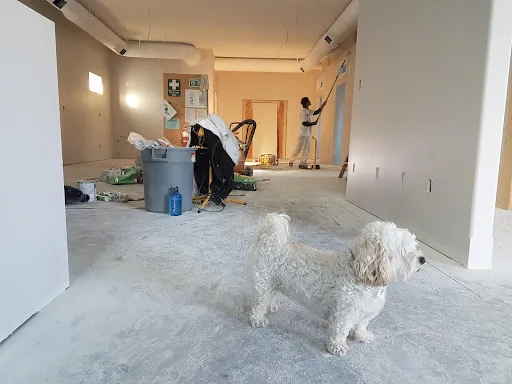Table of Contents
#1. Hire the right professionals to manage the project
When it comes to home remodeling, hiring the right professionals and effectively managing the project can help homeowners avoid overspending. One crucial step is researching and vetting potential contractors thoroughly. Homeowners should talk to a range of contractors and subcontractors, picking their brains and gathering as much information as possible.
Additionally, it’s important to make the general contractor the point person for the project and stay involved throughout the remodeling process. This ensures that the homeowner has a clear understanding of the project scope and can actively participate in decision-making.
#2. Don’t be afraid to interview multiple contractors
Never feel like you’re locked into one contractor just because you called them first. Obtaining multiple quotes and negotiating prices is another effective strategy to avoid overspending during a home remodeling project. Homeowners should shop around and get quotes from different contractors to compare prices and find the best deal.
One couple in Lynnwood WA was able to negotiate an incredible deal on their home remodel by hiring the specialty contractors themselves. This saved them the money the general contractor would have made on each of the services.
The couple was able to save $5300 by hiring these plumbers in Lynwood, WA. They negotiated their own plumbing remodeling in the basement and two bathrooms where they were moving fixtures and the job require more detailed plumbing work.

#3. Ask a lot of questions
It’s also essential to ask questions about materials, layout, and the construction process to digest the time and costs associated. If you understand the length of time each process takes and what’s involved, you’re able to make better-informed decisions and potentially save money on remodeling projects.
#4. Keep an open line of communication
Effective communication with contractors is crucial for staying within budget during a home remodeling project. Homeowners should communicate their needs, goals, and budget constraints clearly to the contractors. Prioritizing renovations and sequencing the work in the optimal order can also help homeowners avoid unnecessary spending.
By assessing needs and goals and prioritizing renovations, homeowners can focus on what’s most important and allocate their budget accordingly. Additionally, practicing good communication, acceptance, and self-care throughout the remodeling process can help homeowners stay on track and avoid overspending.
#5. Set realistic expectations and goals
Before embarking on a home remodeling project, it is crucial to assess your needs and set realistic goals. This involves having a family meeting to discuss everyone’s expectations and understand what your life will be like before, during, and after the remodel.
By setting clear goals and expectations, you can avoid overspending on unnecessary features or changes that may not align with your needs.
#6. Get advice from close friends and family
Talking to friends or family members who have undergone remodeling projects can provide valuable insights and help you make informed decisions about your own project. According to
According to Jason Tierney from Bathroom Renovations Oshawa, one of his clients avoided a $3,000 mistake simply by speaking to family. Apparently, they didn’t know that moving plumbing systems in a bathroom is akin to major surgery.
It was a process their family was aware of and able to tell them about before they committed to any major bathroom renovations.
#7. Budget your project accordingly
Creating a detailed budget is essential to avoid overspending during a home remodeling project. Start by determining how much you are willing to spend and allocate funds for each aspect of the renovation.
Consider factors such as the cost of materials, labor, permits, and any unexpected expenses that may arise.
It is important to be realistic about your budget and avoid stretching it beyond your means. By setting a budget and sticking to it, you can ensure that your remodeling project remains financially manageable.
#8. Shop around and research prices on labor and materials
Researching and comparing prices of materials and labor is another crucial step in avoiding overspending during a home remodeling project. Take the time to research the prices of materials and labor in your area. This will give you a good idea of what to expect in terms of costs and can help you make informed decisions when selecting materials and hiring contractors.
Additionally, consider alternative options and compare prices from different suppliers to ensure you are getting the best value for your money. By being diligent in your research, you can avoid overspending on materials and labor, ultimately keeping your remodeling project within budget.
#9. Make smart design choices by prioritizing your goals
When embarking on a home remodeling project, it is crucial to prioritize and make smart design choices to avoid overspending. One way to do this is by identifying essential versus non-essential upgrades. It’s important to focus on the upgrades that will have the most significant impact on your daily life and the value of your home.
For example, instead of blowing out walls to gain square footage, consider reorganizing and equipping your kitchen for maximum efficiency. This approach allows you to make the most of your existing space without breaking the bank.
By distinguishing between essential and non-essential upgrades, you can allocate your budget wisely and avoid unnecessary expenses.
#10. Go for the less expensive option when it makes sense
Another tip to avoid overspending on home remodeling is to consider cost-effective alternatives. For instance, instead of opting for high-end materials, explore cheaper alternatives that offer a similar aesthetic appeal.
#11. Opt-in for the DIY jobs within your bandwidth
Additionally, if you have the skills and time, consider doing some of the work yourself to save on labor costs. By being resourceful and open to cost-effective alternatives, you can achieve the desired results without exceeding your budget.
#12. Optimize the functionality of your living space
Maximizing existing space and functionality is another key factor in avoiding overspending on home remodeling. Before making any structural changes, evaluate how you can make the most of your current layout.
This may involve reconfiguring furniture, adding storage solutions, or bringing in natural light without the need for additional windows.
By maximizing the functionality of your space, you can enhance its value and appeal without the need for costly renovations. This will help you prioritize your remodeling goals and make informed decisions that align with your financial capabilities.
#13. Keep your finger on the pulse of your spending
One of the key strategies to avoid overspending during a home remodeling project is to track and review expenses regularly. By keeping a close eye on your budget and comparing it to your actual expenses, you can identify any areas where you may be overspending and make necessary adjustments.
This regular monitoring allows you to stay on track and make informed decisions about where to allocate your funds.
Additionally, it helps you identify any potential cost-saving opportunities and make adjustments accordingly. This proactive approach can help you avoid unexpected financial burdens and keep your remodeling project within budget.
#14. Stick to the plan!
Another important tip to avoid overspending is to avoid making unnecessary changes or additions during the renovation process. While it can be tempting to add extra features or make last-minute design changes, these can quickly add up and inflate your budget.
It’s important to stick to your initial plan and avoid any impulsive decisions that may lead to unnecessary expenses. By staying focused on your original goals and avoiding unnecessary changes, you can prevent overspending and ensure that your remodeling project stays within budget.
#15. Expect the unexpected
It’s crucial to be prepared for unexpected costs and contingencies when undertaking a home remodeling project. Renovations often come with unforeseen challenges and complications that can impact your budget. To mitigate these risks, it’s advisable to set aside a contingency fund specifically for unexpected expenses.
This fund can provide a safety net for any unforeseen costs that may arise during the remodeling process.
Additionally, conducting thorough research, obtaining multiple estimates, and consulting with professionals can help you anticipate potential costs and plan accordingly. By being prepared for unexpected expenses, you can avoid overspending and ensure a smoother remodeling experience.
Final thoughts…
By following these home remodeling tips, homeowners can avoid overspending and ensure that their projects stay within budget. Proper planning and budgeting, prioritizing and making smart design choices, hiring the right professionals, and monitoring and controlling expenses are all key factors in successfully managing a home remodeling project.
By assessing needs, setting realistic goals, creating a detailed budget, and researching prices, homeowners can make informed decisions and avoid unnecessary expenses.
Additionally, by identifying essential upgrades, considering cost-effective alternatives, and maximizing existing space, homeowners can save money while still achieving their desired results.
Hiring reputable contractors, obtaining multiple quotes, and maintaining clear communication throughout the project can also help to prevent unexpected costs and ensure that the project stays on track.
Finally, regularly tracking and reviewing expenses, avoiding unnecessary changes, and being prepared for unexpected costs can all contribute to a successful and cost-effective home remodeling project.
















